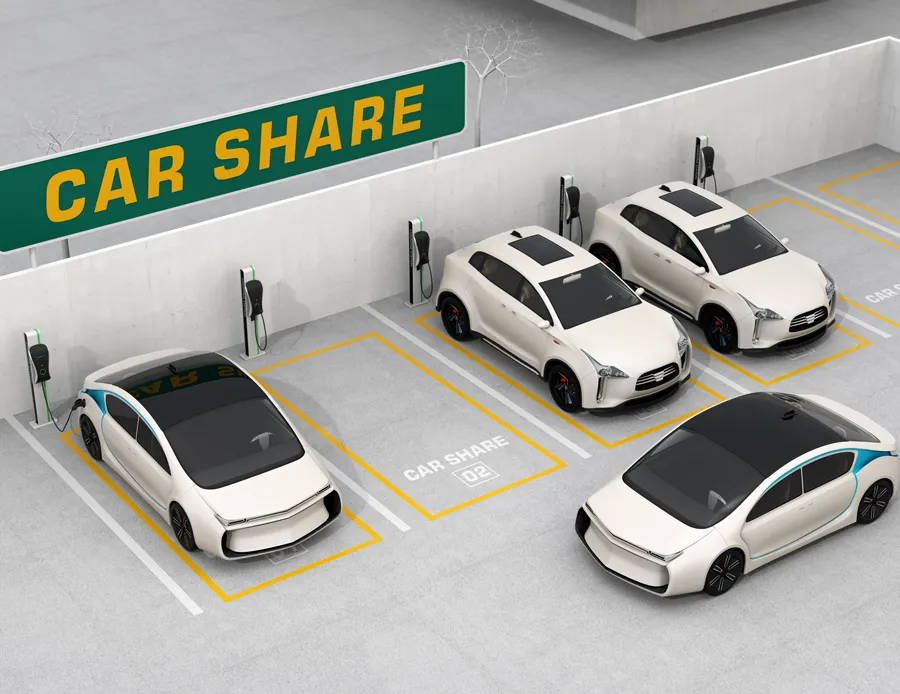In an era characterized by shifts in the desirability of car ownership as well as the large-scale transportation implications of a global pandemic, vehicle rental service companies and car clubs are adapting to this new business environment in innovative ways. As this transformation encourages rethinking every aspect of car ownership, operation, and maintenance, telematics is proving once again to be a valuable technology for capturing and evaluating vehicle operational data. This data can translate into business innovations, guide decision-making, and help achieve business goals.
“Since its inception, the automobile has been a flashpoint for technological, economic, and social innovation, doing as much as any human invention to change how people live—largely, but always for the better. Now’s it’s time to buckle up again: the levels of disruption coming over the next dozen years are likely to exceed those of the previous 50 or more.” ¹
– Kersten Heineke and Philipp Kampshoff, McKinsey & Company
The impact of COVID-19 on this sector should not be underestimated. A host of issues have emerged in response to the pandemic, including precautions leading to touchless vehicle rentals, the need for sanitization requirements surrounding shared vehicle use, individual concerns over the use of public transit, changes in car-pooling habits, the increase in work-at-home scenarios, and other factors.
Even before COVID-19, car ownership attitudes were beginning to shift dramatically as the millennials—children of the car-loving boomer generation—embraced the sharing economy and do not feel as compelled to own private automobiles. This transition toward a mobility model for vehicle use ripples through multiple automotive-related industries, giving birth to ridesharing, car sharing, car clubs, and per-use short-term rentals. Combined with the demographic shift in population toward urban centers, where vehicle ownership can often be an expensive burden, mobility operators are discovering fertile ground for growth and investing more capital in alternative vehicle-use models that deliver convenient access to automobiles, when they are needed and on-demand.
Many of the challenges facing car clubs and rental service companies can be met using recent advances in telematics technology, including:
- Capturing data on vehicle operations and vehicle health in real-time and alerting drivers to maintenance requirements
- Improving claims management and reducing the aggregate costs of claims
- Enhancing vehicle security and assisting law enforcement in locating stolen vehicles
- Identifying drivers who are abusing vehicles and engaged in illegal behaviors
- Transmitting vehicle location information
Given the current landscape in this sector, digital acceleration tools can help to streamline processes, making it possible to minimize contact with rental vehicle staff members, simplify the rental process, and enable touchless usage (for both customer convenience and to lower the COVID-19 risk potential).
A knowledgeable TSP can explain the available data-capture options, explain the tradeoffs of each, and outline the techniques that can be used to reduce costs in a market that has very narrow profit margins. Collecting and applying the insights from an abundance of vehicle and operator data has been shown to be a viable way to control costs.
“Car rental has been badly affected since it relies on inbound tourism for a lot of its business. Many companies have had to effectively suspend their operations as travel restrictions have kept people in their homes. As a result of the lowered demand, airport car lots are filling up with unused vehicles and some companies have had to rent additional off-site parking to store extra vehicles or to reduce the size of their fleet. Hertz has announced temporary closures of almost 600 locations while Avis announced cost saving measures that include a 70% reduction in its workforce and a 20% reduction in its fleet. COVID-19 is also having a negative impact on the vehicle leasing industry.”²
– Research and Markets, Auto Rental and Leasing Affected by COVID-19 Travel Restrictions, May 20, 2020.
Fundamental Challenges for Car Clubs and Vehicle Rental Service Companies

Car clubs exist in two basic forms:
- Those that operate on a fleet basis, such as Zipcar and Enterprise Car Club, offering an automated way to rent a vehicle hourly, daily, or overnight
- Those that operate on a peer-to-peer (P2P) basis, such as Turo, providing car sharing between individual vehicle owners and renters
COVID-19 has caused disruption for both car club types, introducing the need for more stringent cleaning and sanitizing of vehicles to minimize potential virus spread. The challenges associated with the COVID-19 era have been lessened and innovative techniques have emerged to improve efficiency and safety, many of them linked to the capabilities of telematics data to inform vehicle owners of the status, location, availability, service requirements, and condition of vehicles.
Among the key challenges for car clubs:
- A reliable mechanism for confirming the location of dropped-off vehicles is a key concern, particularly if a vehicle has been dropped off in a different location than expected or if it has been towed.
- Long-standing problems exist around unreported accidents taking place during vehicle use. Vehicles are frequently dropped off without the owners or responsible agency being able to inspect them upon return, relying on the honesty of the driver to report any damage or incidents.
- Insurance claims, including issues of fault, can create complexities for car clubs trying to accurately re-create any incidents or accidents that take place while the vehicle was being driven or if it was damaged or stolen in a parking area.
- Remote access technologies have also escalated the problem of theft, which is compounded as thieves discover new ways to circumvent security systems.
Because car club users are typically more comfortable using automation and apps as part of the service process—since this is generally the way they sign up to obtain short-term vehicle use—many of the capabilities of apps can help various challenges. Similarly, apps linked to vehicle operational data can make a tremendous difference in claims settlement and fault determination.
Standard vehicle rental service companies, including Enterprise, Hertz, and Avis, have suffered particularly hard due to COVID-19’s impact on tourism. In response to the pandemic, many of these services are adopting the methods that have been used successfully by car clubs to automate rental processes and employ touchless operations for the customers whenever possible. By doing this, these rental services are improving customer experiences, as well as reducing administrative costs and staff time, effort, and exposure. The same heightened need for cleaning and sanitizing is a fundamental challenge. The longer it takes to clean and release cars back into service, the more that rental revenues are impacted.
Rental agencies are discovering that it is possible to reduce staff members through digital transformation of their businesses. Having ready access to vehicle data—including odometer readings before and after trips, DTC indications that have been triggered, fuel levels before and after the rental, and oil and coolant levels. Vehicle servicing can be streamlined and drivers quickly notified if safety problems with the vehicle become evident.
Dealing with insurance claims effectively is another fundamental challenge that includes finding ways to reduce claims expenses, accurately determining fault in accidents, and settling claims efficiently so that they do not unduly affect profit and loss numbers.
Like the car club situation, rising instances of vehicle theft present a persistent challenge to standard vehicle rental services in many geographical locations, as well. These thefts are often related to the side effects of touchless entry and automated services, as thieves are finding ways to hack keyless access systems and steal vehicles that are in unattended locations.
Drivers exceeding the maximum mileage stated in a rental contract can be assessed penalties, which can ruin an otherwise positive customer relationship. Having access to odometer readings through data capture and communication can help detect potential overages and give customers opportunities to update their agreements or modify their driving to stay within limits.
A small but problematic proportion of drivers that rent vehicles treat them recklessly and often become involved in accidents or damage the cars they are renting. Rental agencies and car clubs can benefit from acquiring driver behavior information, screening for those drivers most likely to cause damage and problems to vehicles. Poor driver behavior directly affects profits for car clubs and rental agencies, but new techniques based on telematics technologies have shown promise, to improve driving behavior and taking advantage of digital acceleration tools to respond more quickly to accidents and settle resultant claims promptly. In extreme instances, bad drivers can be blocked from renting vehicles.
Unlike car club users, rental vehicle users are sometimes reluctant to download and use smartphone apps as a requirement of renting. Rental agencies need to find ways to reduce this resistance to app use to avoid customers walking away from a transaction when there is an app requirement.
Responding to Challenges with Telematics Data

Rental agencies and car clubs face unique challenges to remain competitive in this market sector. Many of the most serious issues involve vehicle security. Rental agencies must effectively secure their assets, particularly for short-term rental services that are being used by a greater variety of drivers and subject to damage and theft more frequently.
Companies operating car clubs or providing car sharing services have the same need to secure assets, but additionally they must contend with other factors, including:
- Damage occurring in parking areas (where customers pick up and drop off vehicles)
- Reliable mechanisms for remotely locking and unlocking vehicles,
- Vehicles being towed away for parking in the unauthorized location,
- Locating and reclaiming impounded vehicles.
A technology-agnostic data exchange coupled with telematics data capture can help car clubs and rental agencies, resolve these issues, including those insurance issues related to short-term vehicle use:
- Vehicle theft: Incidences of vehicle theft vary across different locales and circumstances, but inevitably the costs of recovery and ultimate return of a stolen vehicle to the rental fleet are tremendously important to operators.
- Vehicle crime: Vehicles rented to transport drugs, commit a robbery, or engage in any kind of illegal behavior are an ongoing problem, requiring vigilance and strong oversight.
- Vehicle usage: Profitability depends on keeping vehicles in continuous use as much as possible, ensuring that the appropriate number of cars are in circulation and are being used in ways that improve operational productivity.
- Damage and claims: Accurate and improved management of claims processes and handling damage issues when a vehicle is parked represent serious concerns for car clubs and car sharing companies.

White Paper
Telematics Benefits to Vehicle Rental Companies and Car Clubs
Digital transformation is reshaping the automotive sector and surrounding ecosystem, creating both opportunities and strategic challenges for mobility operators.
- The trends transforming mobility’s future. McKinsey & Company. March 2019. https://www.mckinsey.com/industries/automotive-and-assembly/our-insights/the-trends-transforming-mobilitys-future
-
Auto Rental and Leasing Affected by COVID-19 Travel Restrictions. Research and Markets. May 2020. https://www.prnewswire.com/news-releases/auto-rental-and-leasing-affected-by-covid-19-travel-restrictions-301062611.html



